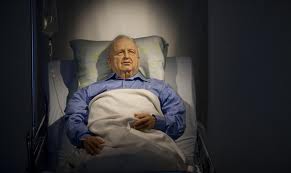 Ariel Sharon, the former prime minister of Israel who has been comatose for nearly eight years, edged closer to death on Wednesday evening, suffering from kidney failure.
Ariel Sharon, the former prime minister of Israel who has been comatose for nearly eight years, edged closer to death on Wednesday evening, suffering from kidney failure.
A spokesman for the hospital that has been treating Mr. Sharon, 85, said that “there has been a deterioration in his medical condition.” A person who had been briefed on the situation, but spoke on the condition of anonymity because of its delicacy, said Mr. Sharon had suffered a setback about a month ago and spent two weeks in intensive care after emergency surgery, then seemed to have stabilized before the most recent turn.
“It looks pretty bad, but it’s not a matter of hours,” said another person with knowledge of his condition who also spoke on the condition of anonymity.
Mr. Sharon, a controversial military commander who rose to hold many of his nation’s top positions, suffered a stroke after shaking up Israeli politics at the height of his power.
An architect of Israeli settlements in occupied Palestinian territory, he stunned the world and his own constituents with a complete withdrawal from the Gaza Strip in 2005. He abandoned the Likud Party he led as prime minister to form the centrist Kadima Party, and he was believed to be preparing for further territorial concessions to establish a Palestinian state when he fell ill.
In a vegetative state since January 2006, Mr. Sharon has been breathing on his own but fed intravenously, and in September he underwent surgery to fix the feeding tube. A year ago, scientists announced that they had found surprising activity in response to external stimuli during a brain scan, suggesting Mr. Sharon might be able to hear and understand.
Mr. Sharon was taken back to his family farm in the Negev Desert for a weekend in 2010, but he has spent the rest of the last seven and a half years in Tel Hashomer hospital outside Tel Aviv, according to the hospital spokesman, Amir Marom. His sons were with him at the hospital on Wednesday, according to the people who had been briefed on the situation.
NY Times

Leave a Reply
You must be logged in to post a comment.